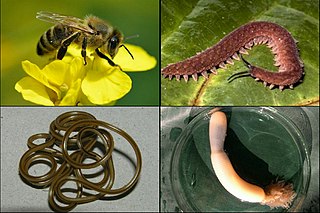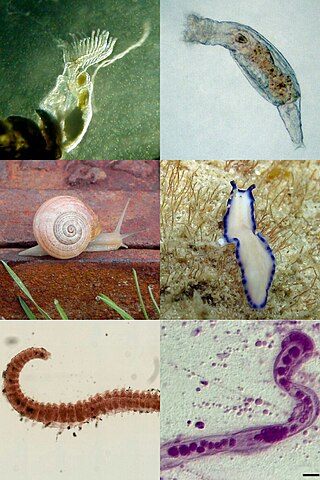Related Research Articles

Ecdysozoa is a group of protostome animals, including Arthropoda, Nematoda, and several smaller phyla. The grouping of these animal phyla into a single clade was first proposed by Eernisse et al. (1992) based on a phylogenetic analysis of 141 morphological characters of ultrastructural and embryological phenotypes. This clade, that is, a group consisting of a common ancestor and all its descendants, was formally named by Aguinaldo et al. in 1997, based mainly on phylogenetic trees constructed using 18S ribosomal RNA genes.

Franciscus Bernardus Maria "Frans" de Waal is a Dutch primatologist and ethologist. He is the Charles Howard Candler Professor of Primate Behavior in the Department of Psychology at Emory University in Atlanta, Georgia, director of the Living Links Center at the Yerkes National Primate Research Center at Emory, and author of numerous books including Chimpanzee Politics (1982) and Our Inner Ape (2005). His research centers on primate social behavior, including conflict resolution, cooperation, inequity aversion, and food-sharing. He is a member of the United States National Academy of Sciences and the Royal Netherlands Academy of Arts and Sciences.
Inequity aversion (IA) is the preference for fairness and resistance to incidental inequalities. The social sciences that study inequity aversion include sociology, economics, psychology, anthropology, and ethology.
In biology, altruism refers to behaviour by an individual that increases the fitness of another individual while decreasing the fitness of themselves. Altruism in this sense is different from the philosophical concept of altruism, in which an action would only be called "altruistic" if it was done with the conscious intention of helping another. In the behavioural sense, there is no such requirement. As such, it is not evaluated in moral terms—it is the consequences of an action for reproductive fitness that determine whether the action is considered altruistic, not the intentions, if any, with which the action is performed.

A pack hunter or social predator is a predatory animal which hunts its prey by working together with other members of its species. Normally animals hunting in this way are closely related, and with the exceptions of chimpanzees where only males normally hunt, all individuals in a family group contribute to hunting. When hunting cooperation is across two or more species, the broader term cooperative hunting is commonly used.
Cheating is a term used in behavioral ecology and ethology to describe behavior whereby organisms receive a benefit at the cost of other organisms. Cheating is common in many mutualistic and altruistic relationships. A cheater is an individual who does not cooperate but can potentially gain the benefit from others cooperating. Cheaters are also those who selfishly use common resources to maximize their individual fitness at the expense of a group. Natural selection favors cheating, but there are mechanisms to regulate it. The stress gradient hypothesis states that facilitation, cooperation or mutualism should be more common in stressful environments, while cheating, competition or parasitms are common in benign environments.
The concept of the evolution of morality refers to the emergence of human moral behavior over the course of human evolution. Morality can be defined as a system of ideas about right and wrong conduct. In everyday life, morality is typically associated with human behavior rather than animal behavior. The emerging fields of evolutionary biology, and in particular evolutionary psychology, have argued that, despite the complexity of human social behaviors, the precursors of human morality can be traced to the behaviors of many other social animals. Sociobiological explanations of human behavior remain controversial. Social scientists have traditionally viewed morality as a construct, and thus as culturally relative, although others such as Sam Harris argue that there is an objective science of morality.
Inequity is injustice or unfairness or an instance of either of the two. Aversion is "a feeling of repugnance toward something with a desire to avoid or turn from it; a settled dislike; a tendency to extinguish a behavior or to avoid a thing or situation and especially a usually pleasurable one because it is or has been associated with a noxious stimulus". The given definition of inequity aversion is "the preference for fairness and resistance to inequitable outcomes".
Primate cognition is the study of the intellectual and behavioral skills of non-human primates, particularly in the fields of psychology, behavioral biology, primatology, and anthropology.

Planulozoa is a clade which includes the Placozoa, Cnidaria and the Bilateria. The designation Planulozoa may be considered a synonym to Parahoxozoa. Within Planulozoa, the Placozoa may be a sister of Cnidaria to the exclusion of Bilateria. The clade excludes basal animals such as the Ctenophora, and Porifera (sponges). Although this clade was sometimes used to specify a clade of Cnidaria and Bilateria to the exclusion of Placozoa, this is no longer favoured due to recent data indicating a sister group relationship between Cnidaria and Placozoa.

The Spiralia are a morphologically diverse clade of protostome animals, including within their number the molluscs, annelids, platyhelminths and other taxa. The term Spiralia is applied to those phyla that exhibit canonical spiral cleavage, a pattern of early development found in most members of the Lophotrochozoa.

Cecilia Heyes is a British psychologist who studies the evolution of the human mind. She is a Senior Research Fellow in Theoretical Life Sciences at All Souls College, and a Professor of Psychology at the University of Oxford. She is also a Fellow of the British Academy, and President of the Experimental Psychology Society.
David Andrew Whiten, known as Andrew Whiten is a British zoologist and psychologist, Professor of Evolutionary and Developmental Psychology, and Professor Wardlaw Emeritus at University of St Andrews in Scotland. He is known for his research in social cognition, specifically on social learning, tradition and the evolution of culture, social Machiavellian intelligence, autism and imitation, as well as the behavioral ecology of sociality. In 1996, Whiten and his colleagues invented an artificial fruit that allowed to study learning in apes and humans.

The cooperative pulling paradigm is an experimental design in which two or more animals pull rewards toward themselves via an apparatus that they cannot successfully operate alone. Researchers use cooperative pulling experiments to try to understand how cooperation works and how and when it may have evolved.
Evolution of cognition is the idea that life on earth has gone from organisms with little to no cognitive function to a greatly varying display of cognitive function that we see in organisms today. Animal cognition is largely studied by observing behavior, which makes studying extinct species difficult. The definition of cognition varies by discipline; psychologists tend define cognition by human behaviors, while ethologists have widely varying definitions. Ethological definitions of cognition range from only considering cognition in animals to be behaviors exhibited in humans, while others consider anything action involving a nervous system to be cognitive.
Inequity aversion in animals is the willingness to sacrifice material pay-offs for the sake of greater equality, something humans tend to do from early age. It manifests itself through negative responses when rewards are not distributed equally between animals. In controlled experiments it has been observed, in varying degrees, in capuchin monkeys, chimpanzees, macaques, marmosets, dogs, wolves, rats, crows and ravens. No evidence of the effect was found in tests with orangutans, owl monkeys, squirrel monkeys, tamarins, kea, and cleaner fish. Due to mixed results in experimental studies it may be that some bonobos, baboons, gibbons, and gorillas are inequity averse. Disadvantageous inequity aversion is most common, that is, the animal protests when it gets a lesser reward than another animal. But advantageous inequity aversion has been observed as well, in chimpanzees, baboons and capuchins: the animal protests when it gets a better reward. Scientists believe that sensitivity to inequity co-evolved with the ability to cooperate, as it helps to sustain benefitting from cooperation.
Cytochrome P450, family 74, also known as CYP74, is a cytochrome P450 family in land plant supposed to derived from horizontal gene transfer of marine animal CYPs.
Jessica C. Flack is a data scientist, evolutionary biologist, and professor at the Santa Fe Institute.

Nichola Jayne Raihani is a British psychologist who is a Professor of Evolution and Behaviour at University College London. Her research considers the evolution of cooperation in nature. She was elected Fellow of the Royal Society of Biology in 2019. Her first book, The Social Instinct, was released in 2021.
Pathogen avoidance, also referred to as, parasite avoidance or pathogen disgust, refers to the theory that the disgust response, in humans, is an adaptive system that guides behavior to avoid infection caused by parasites such as viruses, bacteria, fungi, protozoa, helminth worms, arthropods and social parasites. Pathogen avoidance is a psychological mechanism associated with the behavioral immune system. Pathogen avoidance has been discussed as one of the three domains of disgust which also include sexual and moral disgust.
References
- ↑ "Sarah Brosnan". Sarah Brosnan. Retrieved 2020-12-24.
- ↑ Emory University - Department of Physiology (FIRST) Sarah Brosnan Archived 2005-02-05 at the Wayback Machine (Accessed April 2012)
- ↑ Whitehouse, David (2003) Monkeys show sense of justice, BBC News, 17 September (Accessed April 2012)